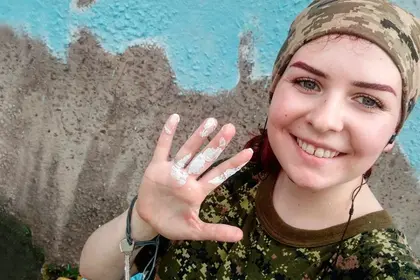A video of Kateryna Polishchuk, better known by the call sign Ptashka (bird in Ukrainian), one of the POWs from Azovstal, has appeared on Russian propaganda platform Artel.doc.
Originally from near Ternopil, Polishchuk was taken prisoner in mid-May, when all the remaining defenders of Mariupol were ordered to lay down their arms.
JOIN US ON TELEGRAM
Follow our coverage of the war on the @Kyivpost_official.
Polishchuk had been in Mariupol’s Azovstal steel mill with the other defenders as a paramedic, part of the volunteer Hospitallers Medical Battalion. She developed a social media following thanks to several videos of her singing patriotic Ukrainian songs among the ruins and in the bowels of the steel mill, which became a fortress as the siege of Mariupol progressed throughout the spring.
In the short video, Polishchuk is labelled as a “sniper,” even though she explicitly denies it in the interview. “I was useful there as a medic. I didn’t go to be a cook, because I’m not a good cook. I didn’t go as a sniper or as a gunner. I came to help as a medic,” she said, in the video that claims to have been filmed somewhere in the Donetsk region.
Polishchuk seemed in good spirits and even joked that she was ashamed at having used vulgar language in one of the Azovstal videos, as her mother would have been upset.
She spoke in Ukrainian and was also filmed marching with five other female prisoners, all still wearing their camouflage fatigues.
“If I had a chance to do it over, I would come to Mariupol again,” she said.

‘One of Moscow’s Biggest Defeats’ – Ukraine at War Update for Jan 2
Since the defenders of the Azovstal steel plant in Mariupol surrendered in May, many questions remain about their whereabouts and treatment.
On July 29 the Olenivka prison in the Russian-controlled part of the Donetsk Oblast, where many Azovstal defenders were being held, was blown up by the Russians. At least 53 were killed and 75 wounded. The Russians falsely attributed the explosion to an American HIMARS attack, even though independent experts observing the aftermath in photos have roundly dismissed that theory.
Some of the prisoners have been exchanged. Many of those freed report having been subjected to routine physical and psychological torture, including beatings and electroshock.
You can also highlight the text and press Ctrl + Enter






